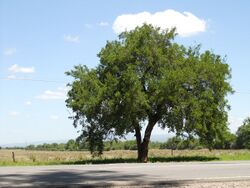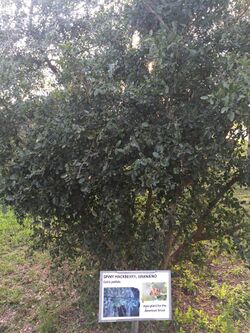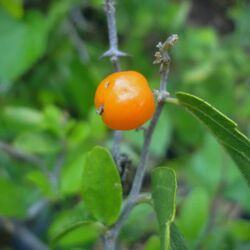Biology:Celtis ehrenbergiana
| Celtis ehrenbergiana | |
|---|---|

| |
| Scientific classification | |
| Kingdom: | Plantae |
| Clade: | Tracheophytes |
| Clade: | Angiosperms |
| Clade: | Eudicots |
| Clade: | Rosids |
| Order: | Rosales |
| Family: | Cannabaceae |
| Genus: | Celtis |
| Species: | C. ehrenbergiana
|
| Binomial name | |
| Celtis ehrenbergiana (Klotzsch) Liebm.
| |
| Synonyms[2][3] | |
| |
Celtis ehrenbergiana, called the desert hackberry or spiny hackberry, is a plant species that has long been called C. pallida by many authors, including in the "Flora of North America" database.[4] It is native to Arizona, Florida, New Mexico and Texas , and to Latin America as far south as central Argentina . It grows in dry locations such as deserts, brushlands, canyons, mesas and grasslands.[5]
Celtis ehrenbergiana is the only US species of the genus with thorns. In the US, it is a shrub or small tree up to 3 m (10 feet) tall, with thorns on the branches, although it can grow taller in the tropics. Leaves are small for the genus, less than 3 cm (1.2 inches) long and 2 cm (0.8 inches) wide. Flowers are born in cymes of 3–5 flowers. Drupes are orange, yellow or red, juicy, egg-shaped, about 7 mm in diameter, and edible by humans and wildlife.[6]
References
- ↑ Timyan, J. (2020). "Celtis ehrenbergiana". IUCN Red List of Threatened Species 2020: e.T152858348A174116715. doi:10.2305/IUCN.UK.2020-3.RLTS.T152858348A174116715.en. https://www.iucnredlist.org/species/152858348/174116715. Retrieved 13 November 2022.
- ↑ Tropicos
- ↑ The Plant List
- ↑ Flora of North America v 3
- ↑ Todzia, C. A. 2001. Ulmaceae. En: Stevens, W.D., C. Ulloa, A. Pool & O.M. Montiel (eds.). Flora de Nicaragua. Monographs in systematic botany from the Missouri Botanical Garden 85(3): 2472–2478.
- Stevens, W. D., C. Ulloa Ulloa, A. Pool & O. M. Montiel Jarquín. 2001. Flora de Nicaragua. Monographs in systematic botany from the Missouri Botanical Garden 85: i–xlii,
- Wunderlin, R. P. 1998. Guide to the Vascular Plants of Florida i–x, 1–806. University Press of Florida, Gainesville. - ↑ Emory, William Hemsley. Report on the United States and Mexican Boundary Botany 2(1): 203. 1859.
- Davidse, G., M. Sousa Sánchez, S. Knapp & F. Chiang Cabrera. 2014. Saururaceae a Zygophyllaceae. 2(3): ined. In G. Davidse, M. Sousa Sánchez, S. Knapp & F. Chiang Cabrera (eds.) Flora Mesoamericana. Universidad Nacional Autónoma de México, México.
- Correll, D. S. & M. C. Johnston. 1970. Manual of the Vascular Plants of Texas i–xv, 1–1881. The University of Texas at Dallas, Richardson.
- Shreve, F. & I. L. Wiggins. 1964. Vegetation and Flora of the Sonoran Desert 2 vols. Stanford University Press, Stanford.
- Sonoran Desert Naturalist, Desert Hackberry
- Southeastern Arizona Wildflowers, Firefly Forest, Celtis ehrenbergiana
Wikidata ☰ Q2727396 entry
 |




